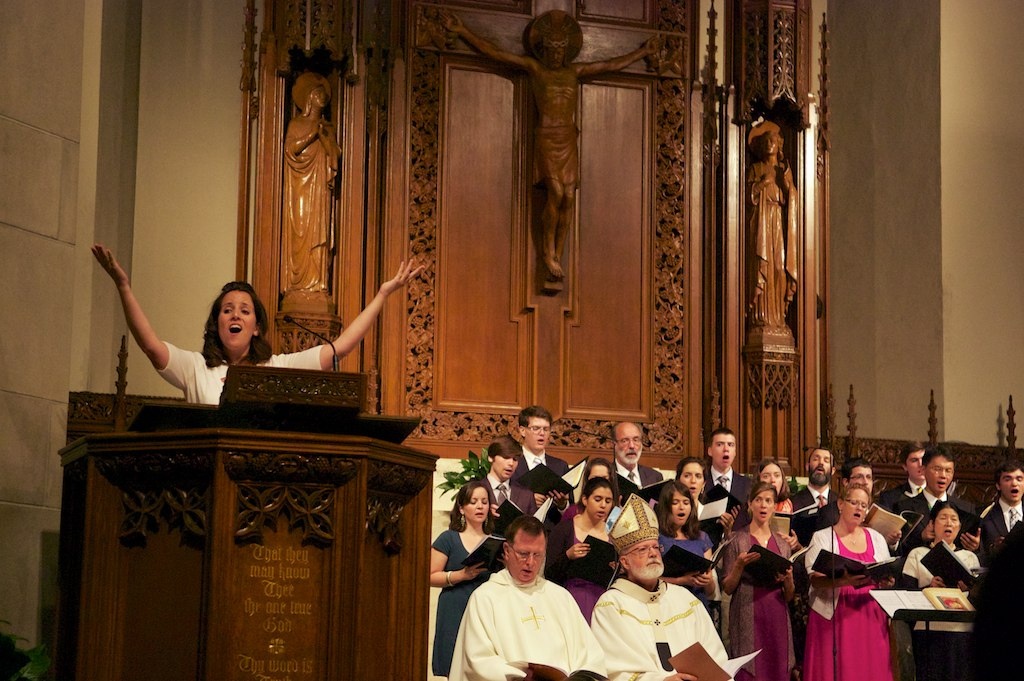On a recent weekend I was called to fill in as cantor at a local parish. I arrived about twenty minutes before Mass, got the list of music from the organist, asked clarifying questions about the community’s worship style, met the priest, confirmed how to pronounce his name when I announced him, answered his questions about what parts of the Mass would be sung, and took my place at the front of the assembly.
A few of the songs were unfamiliar to me, and I silently thanked my college sight-singing professor as I balanced reading the notes and words with making occasional eye contact with the assembly and raising my hand to encourage singing at the beginning of each verse. This particular congregation didn’t need much guidance; they were obviously used to singing, so I backed off from the microphone a bit and let them hear their own voices rather than mine.
A few of the songs were quite familiar, the same as those I had sung with my students at a prayer service earlier that week. I had gathered about 40 adolescent boys for midday prayer that would meet the worship requirement of the campus ministry card they have to fill out before the end of the year. I taught them the Easter Alleluia, around which I had shaped most of the order of worship, telling them I didn’t care what it sounded like: they had to move their mouths in order to get credit for being there. They sang heartily, recited the intercessions and psalms, and left the chapel humming.
I knew most of these boys from religion class, where I teach church history. With the rest of my department I use church history as a doorway into creative problem solving, historical analysis, and the practice of empathy. We use a textbook I wrote for the course, and I include ample opportunity for prayer and reflection. Between that and the music ministry I do at the high school and college level, I am putting my music and theology degrees to good use, much to the surprise of those who believed my studies to be impractical.
But back to my “church gig.” Unfortunately I was only there for one Mass, and I left after thanking the parishioners who welcomed me, and chatting with the music director and deacon. Later that afternoon I sat down to write this reflection on leadership in the Church and froze: what could I have to say about leadership in the Church?
My nervousness, despite having led worship that very morning, speaks to the nebulousness of leadership in the Church. There’s no credential that makes you a leader in the Church outside of the priesthood. My work in liturgy and education obviously demonstrate leadership, but I become skittish and insecure when asked to call myself a leader. Unlike a medical or legal degree, my theology degree doesn’t confer automatic recognition in my field.
Yet here I am, a leader. When I engage in liturgical, musical, or educational leadership I feel the consolation that I have come to recognize as God’s approval of my work. Every time I step in front of a congregation or classroom, I bring a lifelong passion for the work of the Church, my natural desire to lead, and years of training and expertise that I can put in service of the Church.
An older nun who played the organ at my parish for many years once remarked to me that her order was dying out. Then, with the cheerfulness of a woman who has spent all of her life in prayer, she said, “That’s okay, because there are women like you who do what we did.”
This is a great time to be a woman in the Church because it is a great time to be a woman in the world. There is still progress to be made, but my study of history reminds me that our era is better than any other time. Occasionally I get pushback, but what assertive woman doesn’t? There have been times when my hard work has been dismissed, when older men have ignored me despite the fact that I was in charge of an event, and when it has been made clear to me that my forceful personality was unseemly. I’d be shocked if you could find a female leader in any field who hasn’t had to deal with these things.
The sexism I face in the Church corresponds with the sexism I face in the world. Do I wish we were better at these things? Sure. But I don’t feel the extreme oppression that others often assume is part of my lot as a woman in the Church. I have been asked, while leading a group, how it feels to not be allowed to lead in the Church. Reactions range from wide eyes to eye rolls when I try to convince skeptics that the Church is the perfect place for me to exercise the leadership toward which my personality inclines me. I continue to discover the reasons why the Church is where I should lead, but a few have already become apparent.
For the most part, religious institutions are places where everyone is trying to be good. We may not always succeed, and we may give in to negativity too often, but we remain on a path toward sanctity, however slow our progress. Prayer and reflection help me to discipline my natural aggressiveness into fruitful leadership. Also, working in ministry allows me to work with people. This may at times be frustrating, but it is never dull.
Most importantly, I am a leader in the Church because it is the way that I follow Christ’s call of discipleship. I was an energetic little girl who loved going to Mass, and I found a way to be a sacramental and liturgical leader. I don’t doubt for a second that this is exactly where I am meant to be. There are those whom this confounds, either because they think that without ordination I am not a “real” leader, or because they think I am unaware of my own oppression. With all that I am doing I don’t have energy to waste on their misconceptions. I was baptized into Christ’s mission, born with a desire to lead, and have been blessed to combine those two things. I was surely called into leadership, even if it is one I struggle to name and understand.
Featured Image: By Margaret Felice.



